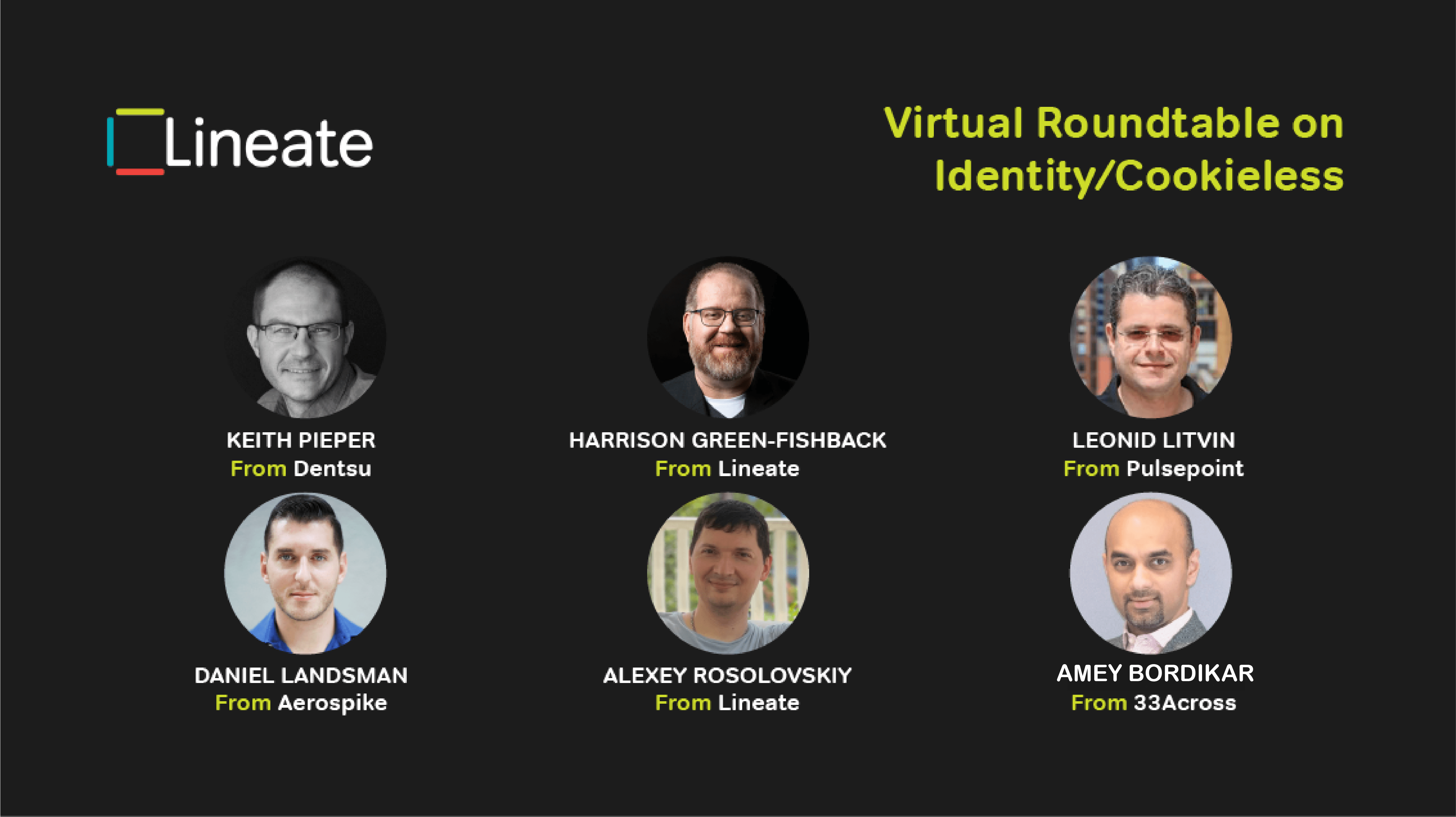
AdTech Industry Roundtable Discussion
Lineate is a leading implementer of cloud solutions, helping AdTech and MarTech organizations scale their technology to manage vast data volumes. Its expertise in AdTech and MarTech and its unique company culture focused on knowledge and creativity set it apart in a competitive industry. Customers love working with Lineate because it is the market leader in developing custom software solutions for nearly all problems in the AdTech world. Because of its can-do attitude, Lineate is a problem solver who enjoys surprising its partners with innovative solutions.
To highlight its experience and industry expertise, the Lineate team held an AdTech Roundtable joined by the industry leaders: Keith Pieper (Dentsu), Amey Bordikar (33Across), Leonid Litvin (Pulsepoint), Daniel Landsman (Aerospike), and Alexey Rosolovskiy (Lineate).
Moderated by Lineate's Chief Technology Officer Harrison Green-Fishback, the Roundtable was an excellent opportunity to discuss the evolving AdTech landscape. Among the issues raised were the challenges and opportunities of third-party cookie deprecation and its impact on AdTech, innovations like Google Privacy Sandbox, and other AI implementations. The participants also touched on alternative approaches pursued by companies like Microsoft. Compliance and user privacy were also among the key topics.
The digital media industry has been hearing about the inevitable demise of cookies for years, and the time has come, with Google declaring that cookies will be phased out from its industry-leading Chrome browser by the end of this year. In doing so, cookies will be rendered obsolete, marking one of the most significant changes in the history of digital media, a move commonly known as “cookie deprecation.”
The Roundtable participants were given insight into a Lineate customer who already uses the Privacy Sandbox, using the Protected Audiences API and Bounce Tracking.
The Lineate Roundtable participants also discussed the implications of Google’s Privacy Sandbox and alternative approaches pursued by companies like Microsoft, which is developing its own privacy sandbox for its Edge browser. It was noted that developers themselves admit that they are not focused on aligning with Google’s Sandbox, so there’s a possibility the APIs will be incompatible, and the companies using them will need to integrate with Google/Chrome and Microsoft/Edge separately.
While discussing the guidelines for the Privacy Sandbox, participants were asked what they think about cross-device targeting, tracking, signals, a “huge growth area,” mobile devices/apps, etc., none of which heavily depend on cookies. Those present recognized that IP addresses might be helpful for the time being but not long-term.
On privacy, it was highlighted that the World Advertiser Federation has joint global guidelines and a HALO framework for reporting and tracking. This does not affect cookies; it simply shows that AdTech players have understood the game rules, that laws are moving towards the idea of privacy-enhanced requirements, and that they have started to collaborate on the design of AdTech standards that will help to run businesses in a privacy-enhanced fashion.
The discussions also touched on the importance of compliance in sensitive sectors like health advertising, underscoring the need for legal adherence and user privacy. It was agreed that following the law and having a solid legal department is critical.
The conversation then shifted to user empowerment and perceptions of data sharing, with varying viewpoints on the balance between targeting and contextual advertising.
To the question of how we can change the perception of data sharing and privacy and empower and convince users to use their own judgment and self-regulation, it was suggested that it is “too late” and that “the AdTech industry has overshared and overmined data, and smart companies and users will focus more on privacy.”
Some participants suggested users should be educated about the binary options of ‘either you give data and have free-of-charge content’ or ‘pay for content without your data.’ In contrast, others offered a counterpoint, highlighting the importance of targeting/retargeting a particular user versus contextual targeting based on the content consumed by a user.
Innovations like AI implementations were also spotlighted at the Lineate Roundtable, including ChatGPT's role in mobile app user acquisition, which showcased a promising 15% revenue lift. Indeed, since the Roundtable, the ChatGPT mobile app’s net revenue jumped 22% on the day of the GPT-4o launch and continued to grow in the following days, according to Appfigures.
Gathering critical figures from the industry, Lineate’s Roundtable on AdTech and Privacy allowed participants to discuss the hurdles and potentials presented by a privacy-centric environment. Emphasizing the phase-out of third-party cookies and Google's Privacy Sandbox, the discourse highlighted the need for creative solutions and collaboration to harmonize user privacy and AdTech efficacy.